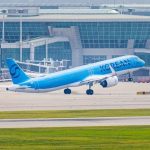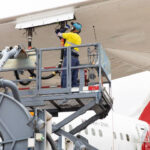Madrid-based energy group Cepsa and Singapore-controlled Bio-Oils, a division of Apical, have announced the start of construction of a new biofuels plant in southern Spain, which from 2026 aims to produce low carbon transport fuels from agricultural waste or used cooking oil. The partners say their new second generation (2G) fuel facility in Huelva will have annual capability to flexibly produce 500,000 tons of SAF and renewable diesel, as well as biogas and biogenic CO2, and claim that through the use of renewable hydrogen and electricity, and multiple heat recovery and energy efficiency systems, it will emit 75% less CO2 than other biofuel plants. It will also use reclaimed water rather than fresh supplies. Elsewhere in Spain, energy company Repsol has received certification from the Roundtable on Sustainable Biomaterials (RSB) that permits it to trade SAF within RSB’s book-and-claim system. This enables Repsol to sell and deliver SAF at specific airports and enter it into the RSB registry, thus allowing customers at other airports around the world to claim the carbon reductions of the registered SAF when purchasing traditional jet fuel.
Together with facilities they already operate in Huelva, in Spain’s Andalusia region, Cepsa and Bio-Oils expect to form Europe’s second-largest renewable fuel complex, with total annual production capacity of 1 million tons, the use of which they claim will prevent the emission of 3 million tons of CO2 per year, equivalent to 4% of the emissions produced by road transport in Spain.
At a time of growing concern about funding for sustainable aviation programmes, the new plant is also solidly supported, with Cepsa jointly owned by the UAE sovereign investment company Mubadala and Washington DC-based global investment fund The Carlyle Group, while Bio-Oils is a division of Singapore-based industrialist Apical, a leading international producer of vegetable oil products including renewable fuel feedstocks. The two will invest €1.2 billion ($1.3bn) in the Huelva project, which is also supported by the regional government of Andalusia, and is expected to create 2,000 direct and indirect jobs during the construction and operation phases.
“This strategic project for Spain and Andalusia will make us a European benchmark in the field of green molecules and facilitate the immediate decarbonisation of sectors that cannot run on electrons, like aviation,” said Cepsa CEO Maarten Wetselaar. “This is the start of a new chapter for Cepsa and this region that will generate quality employment and a new era of industrialisation.”
Apical’s Executive Director, Pratheepan Karunagaran, said global production of SAF was expected to triple this year compared to last, but added that availability of sustainable feedstock was a challenge for many countries. His company has signed a long-term agreement to supply feedstock for the new Huelva plant.
“As we continue to expand Apical’s global footprint and capacities, the availability of waste and residue is set to grow in tandem, enabling value-added partnerships to be forged for our waste stream to drive the production and adoption of SAF,” said Karunagaran. “Our 2G biofuels plant with Cepsa, which will be the largest aviation fuel processing facility in southern Europe, is an excellent example of how industry players can come together to unlock the potential of SAF and scale up adoption in an affordable manner.”
Juan Manuel Bonilla, President of the regional government of Andalusia, said his region “is ready to become Europe’s major producer and distributor of clean energy, playing a key role in the irrevocable goal of decarbonising the planet. This future biofuel plant by Cepsa is a clear and valuable example.”
Elsewhere in southern Spain, Repsol is currently completing final commissioning of its advanced biofuels plant in Cartagena, which will have the capacity to produce 250,000 tons of SAF and renewable diesel per year from organic waste. The company has been producing SAF at its refineries since 2020 and supplying airlines including Iberia, Air Europa, Vueling, Iberojet and cargo operator Atlas Air. In May 2023, Repsol signed a long-term agreement with Ryanair to supply up to 155,000 tons of SAF for its operations in Spain and Portugal between 2025 and 2030.
Repsol said gaining the new RSB certification will open a wider global market for it to supply SAF from the Cartagena plant.
“Being certified to access the world’s most credible and robust book-and-claim system is a milestone for Repsol,” said Carlos Suarez, the company’s Director of International Aviation. “It enables us to introduce more SAF into the supply chain, allowing more players in the aviation sector to take advantage of the benefits from SAF. Our new plant in Cartagena is a guarantee that we can supply the fuel and thus help boost the reduction of the carbon footprint of air transport.”
RSB’s chain of custody model has been developed to ensure full traceability and credibility, as well as a demonstrable climate impact by avoiding double counting in the process, says Repsol. The carbon reductions associated with the SAF are registered as a ‘book-and-claim unit’ and transferred to any willing buyer globally, while the physical fuel delivered at the nearest airport does not have any sustainability criteria attached. Currently, book-and-claim is only targeting voluntary markets and not compliance regimes.
“Trust is the centrepiece of book-and-claim, and delivering a trustworthy solution built on a genuinely global muti-stakeholder approach is fundamental for the RSB,” said Elena Schmidt, Executive Director of RSB.
Repsol received the certification through SGS, accredited by RSB to perform independent audits. “Verification by SGS guarantees the traceability, accuracy and coherence of the information communicated and reinforces the transparency of Repsol’s chain of custody processes,” said Jesús Bennasar, Director of Sustainability Services at SGS Iberia.
Photo: Cepsa
Additional reporting by Christopher Surgenor














More News & Features
LanzaJet and KMG agree to progress SAF production project in Kazakhstan
SkyNRG says e-SAF and carbon removals should not be competing strategies for aviation decarbonisation
South Korea announces mandatory SAF blending for departing international flights from 2027
Catagen launches SAF production company and signs offtakes with Ryanair and Shell
Australia announces A$1.1bn incentive scheme to drive local production of low carbon fuels including SAF
Oneworld airline partners join with Breakthrough Energy Ventures to invest in new SAF technologies